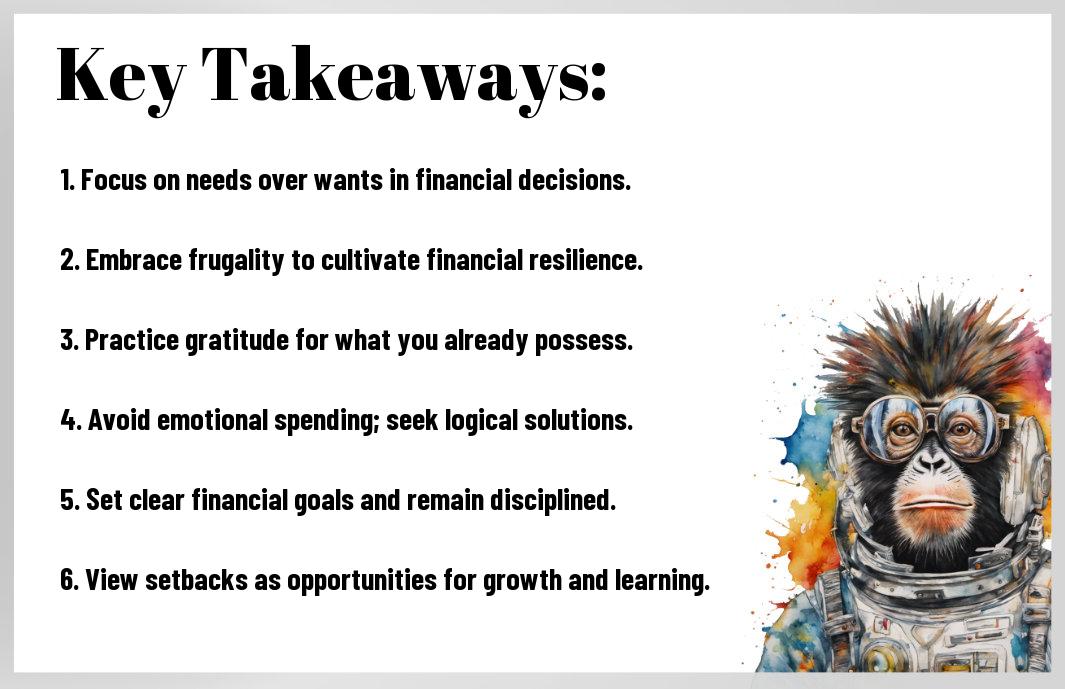There’s something incredibly freeing about embracing a Stoic mindset toward money management. As I navigated my financial journey, I discovered that applying Stoic principles can help you build a healthier relationship with your finances. Instead of focusing solely on wealth accumulation, I learned to prioritize spending wisely, feeling grateful for what I have, and maintaining inner peace amidst financial stress. Join me as I share actionable tips on how to manage your money the Stoic way, allowing you to cultivate both financial stability and emotional resilience.
Key Takeaways:
- Self-Control: Developing discipline in spending helps avoid unnecessary financial burdens.
- Perspective: Viewing money as a tool enhances financial decision-making and prioritizes long-term goals.
- Contentment: Embracing minimalism encourages satisfaction with what one has, reducing the desire for excessive consumption.
- Detachment: Practicing emotional detachment from money can prevent impulsive financial decisions driven by fear or desire.
- Values: Aligning spending habits with personal values leads to more meaningful financial choices.
- Preparedness: Establishing an emergency fund enables individuals to remain calm and make rational choices during financial crises.
- Continuous Learning: Cultivating a habit of education about finances empowers better money management and informed investment decisions.

Understanding Stoicism
For those of us looking to manage our money more effectively, delving into Stoicism can offer valuable insights. Stoicism is more than just an ancient philosophy; it’s a practical guide that can provide you with a clearer perspective on life and your finances. By understanding and applying Stoic principles, you can foster a sense of calm and control over your financial decisions, helping you navigate the often-choppy waters of personal finance with grace and resilience.
The Basics of Stoic Philosophy
Above all, Stoicism teaches us that our perceptions shape our reality. This philosophy emphasizes focusing on what we can control, while accepting what we cannot. For instance, I often remind myself that external events, like market fluctuations or unexpected expenses, are beyond my grasp. However, I can control my reactions, judgments, and choices in response to these events. This perspective not only reduces anxiety but also empowers me to make wiser financial decisions, free from the pressures of outside forces.
Key Tenets for Managing Money
After exploring the foundational concepts of Stoicism, I find it necessary to apply some key tenets to my financial life. One of the core principles is the distinction between wants and needs. As I navigate my budget, I strive to evaluate my spending habits critically. Am I purchasing something out of desire or necessity? By prioritizing needs and minimizing unnecessary wants, I pave the way for a healthier financial future. Additionally, practicing gratitude helps me appreciate what I already have, which can, in turn, diminish my desire for more, reducing impulsive spending.
It is also important to keep perspective when facing financial setbacks. Viewing challenges as opportunities for growth aligns with the Stoic mindset. When I experience a financial hiccup, I work to adopt a solution-oriented approach rather than succumbing to despair. By applying Stoicism to my financial practices, I cultivate a more balanced, intentional relationship with money that fosters both peace of mind and long-term stability.
The Importance of Financial Discipline
Some people may view money management as a tedious task, but I believe it offers a profound opportunity for personal growth. Financial discipline is not just about saving pennies; it’s about cultivating a mindset that encourages stability and clarity. By honing your financial discipline, you can develop greater self-control, reduce stress, and pave the way for a more enriching life. The Stoic philosophy teaches that true wealth comes from inner peace and the ability to manage our desires, and applying this principle to our finances can lead to a more balanced existence.
Developing a Stoic Mindset
Along my journey to financial discipline, I’ve found that developing a Stoic mindset plays a significant role. It involves recognizing what is within my control, such as my spending habits and investment choices, and understanding what is not, like market fluctuations or economic downturns. When I focus on these controllable factors, I feel empowered, and this fosters a sense of responsibility that extends beyond just my finances. Embracing this perspective allows me to remain calm and composed, even when facing financial uncertainties.
Practical Tips for Financial Discipline
By integrating practical tips into my financial discipline, I’ve noticed a tangible difference in my spending habits. Here are a few strategies that have helped me hold myself accountable:
- Create and stick to a budget that reflects my values and goals.
- Set specific savings goals to motivate my journey and track my progress.
- Limit impulsive purchases by implementing a cool-down period before buying any non-importants.
- Seek out advice from reliable sources, ensuring my financial education stays updated.
Knowing these tips can turn the daunting task of managing money into an enriching experience.
Financial discipline doesn’t happen overnight, but I’ve discovered that small, consistent changes can have a big impact. Here are additional strategies that I’ve found useful:
- Practice mindfulness when it comes to spending—ask yourself if you truly need something before making a purchase.
- Regularly review your financial plan, adjusting it as needed to reflect your evolving circumstances and goals.
- Automate your savings to ensure that the first portion of your income goes towards your goals.
- Celebrate your financial achievements, no matter how small, as they contribute to your overall journey.
Knowing these can help reinforce the discipline required to succeed financially while aligning with Stoic values.
Embracing Minimalism
Despite living in a world that often glorifies excess, I’ve found that embracing minimalism has been a transformative step in managing my finances. In my journey towards a more Stoic lifestyle, I’ve discovered that simplifying my possessions and spending not only eases my financial burden but also creates more room for fulfillment and joy. By focusing on what really matters, I can better allocate my resources—both money and time—toward experiences and connections that enrich my life, rather than getting lost in a maze of materialism.
Less is More: A Stoic Approach
Approach this journey with the understanding that abundance can be found in what we already have. As a Stoic, I embrace the idea that true wealth doesn’t lie in accumulating more but in appreciating less. When I choose to live with what I need and release what I don’t, I free myself from the mental clutter that often accompanies financial strain. It’s empowering to realize that my worth isn’t defined by my possessions but by my character and how I contribute to the world around me.
Identifying Needs vs. Wants
Below the surface of our consumption lies a significant distinction between needs and wants that shapes our financial decisions. In my experience, it’s often easy to conflate the two, leading to impulsive purchases and unnecessary stress. By taking time to reflect, I can weigh what I truly need—such as basic living expenses and important experiences—against those fleeting desires that often pop up in the moment. It’s empowering to realize that many things I once thought were necessary can actually be classified as mere luxuries.
And as I navigate this distinction, I find it helpful to ask myself important questions about my purchases. Will this bring me lasting happiness, or is it merely a fleeting thrill? Does it contribute to my well-being, or is it just clutter that will weigh me down? By leaning into this practice of evaluating what truly serves me, I can cultivate a more intentional and fulfilling lifestyle that aligns with my values. Observing my habits helps me appreciate how living with less can lead to a richer, more meaningful existence.
Setting Meaningful Goals
After finding a solid understanding of my finances, the next step is setting meaningful goals that not only aim for financial success but also resonate with my core values. I’ve learned that merely accumulating wealth isn’t enough; it’s about creating a life that aligns with what truly matters to me. By establishing well-defined goals, I can navigate my financial journey with purpose, ensuring that my decisions ultimately reflect my personal principles and aspirations.
Aligning Finances with Values
Any time I consider my financial goals, I make it a point to reflect on my values first. Understanding what’s important to me allows me to craft financial objectives that are not only relevant but also fulfilling. For instance, if I value experiences over material possessions, I might prioritize saving for travel or educational opportunities rather than an extravagant car or house. This alignment keeps my focus sharp and fuels my motivation, making the journey feel worthwhile.
Long-Term vs. Short-Term Goals
Setting financial goals also means distinguishing between long-term and short-term objectives. Long-term goals, such as saving for retirement or a child’s education, often require patience and strategic planning. In contrast, short-term goals might revolve around immediate needs, like paying off debt or building an emergency fund. By having a mix of both types, I can maintain balance in my financial approach, ensuring that I’m addressing both urgent and future aspirations effectively.
Values play a key role in determining how I approach both long-term and short-term goals. I find that if my financial targets resonate with my values, I’m more likely to stay committed to them. For instance, setting a goal to invest in sustainable companies might appeal to my desire to make a positive impact on the environment, while a short-term goal of budgeting for a summer vacation aligns with my value of family time. This clear connection makes my financial planning not just about numbers, but about building a life I genuinely love.

Cultivating Resilience in Financial Challenges
Many of us face financial challenges that can feel overwhelming, but embracing a Stoic mindset can empower us to navigate these obstacles with strength and clarity. The Stoics believed in focusing on what is within our control, which can help us cultivate resilience as we encounter financial setbacks. By practicing acceptance and understanding that not everything lies within our grasp, I find that I can approach each challenge with a more balanced perspective, allowing me to take more thoughtful actions rather than letting my emotions dictate my responses.
Accepting What You Cannot Control
Along my journey, I’ve learned the importance of distinguishing between what I can control and what I cannot. This perspective offers a sense of peace amidst the storm of financial uncertainties. When I face unexpected bills or a sudden change in my financial situation, I remind myself to focus on my reactions and decisions rather than feeling defeated by external circumstances. By accepting that some things are simply out of my hands, I can free up mental space to concentrate on what I can influence—such as budgeting, seeking new income opportunities, and analyzing my spending habits.
Strategies for Overcoming Setbacks
An necessary part of cultivating resilience involves developing strategies for overcoming setbacks when they arise. I’ve found that having a solid plan can be comforting during turbulent times. For instance, maintaining an emergency fund has given me peace of mind, knowing I have a buffer when unexpected expenses crop up. It’s also valuable to engage in continuous learning—whether that means taking courses on personal finance, reading books, or seeking advice from those who have navigated similar situations. Embracing mistakes as learning opportunities rather than failures can help me build stronger financial habits moving forward.
Further, it’s important to foster a positive mindset. When setbacks occur, I try to shift my focus toward potential solutions and opportunities rather than dwelling on what went wrong. This approach not only enhances my problem-solving skills but also reinforces my resilience. By checking in with myself regularly and celebrating my progress, even small victories, I can maintain motivation as I work toward my financial goals. Ultimately, adopting a Stoic attitude allows me to face financial challenges with greater confidence and purpose.

The Role of Gratitude in Money Management
Your relationship with money can often become a source of stress and anxiety, but integrating gratitude into your financial mindset can help shift that perspective dramatically. When I practice gratitude, even for the smallest blessings that come my way, I find that I worry less about what I do not have and appreciate more of what I already possess. This shift allows me to see wealth not merely in monetary terms, but as the richness of experiences, relationships, and the world around me. By focusing on what I already have, I cultivate a sense of abundance, which positively influences my spending habits and financial decisions.
Shifting Perspectives on Wealth
Wealth is often perceived through a narrow lens—one that measures success based on material possessions and financial status. I’ve learned that true wealth can be found in the relationships I nurture, the time I spend with loved ones, and the lessons I gain from my experiences. Every time I acknowledge and appreciate these elements, my perspective broadens, allowing me to redefine what being wealthy really means. This approach helps me feel less pressure to keep up with the external measures of success and instead focus on what genuinely enriches my life.
Practicing Gratitude Daily
By being intentional about incorporating gratitude into my daily routine, I naturally rewire my brain to look for abundance instead of scarcity. Every morning, I start my day by jotting down three things I am grateful for. It might be the comforting cup of coffee I enjoy or the support of friends and family. This practice not only helps me cultivate a positive mindset but also keeps me grounded as I navigate my financial journey. The more I focus on gratitude, the more I notice that my financial worries diminish since I realize how much I already have.
This daily ritual of gratitude has transformed my outlook in more ways than one. I find that I engage in thoughtful spending, prioritize meaningful experiences, and embrace frugality without feeling deprived. When I see the value in my life beyond material wealth, I make financial choices that align better with my values. This ongoing journey of gratitude continually enriches my understanding of how to manage money with a sense of fulfillment and purpose.
To Wrap Up
Summing up, managing money the Stoic way has taught me valuable lessons about handling finances with wisdom and restraint. Instead of letting money dictate my emotions or decisions, I’ve learned to focus on what I can control—my spending habits, my savings strategies, and my overall mindset towards wealth. By practicing gratitude and understanding the impermanence of material possessions, I find that I am more at peace with my financial journey. If you’re facing financial stress, you might find it helpful to explore some thoughtful insights. Check out this Stoic Advice on Financial Stress & Money Issues to guide you.
Ultimately, embodying the Stoic principles has led me to cultivate a healthier relationship with money. Instead of viewing it as something to strive endlessly for, I see it as a tool that, when used wisely, can support my values and goals. I invite you to embrace this mindset, focusing on what truly enriches your life beyond the material realm. Together, we can navigate our financial lives with a Stoic heart and a clearer mind.
FAQ
Q: What is “Manage Money the Stoic Way” all about?
A: “Manage Money the Stoic Way” offers a framework for handling finances through the principles of Stoic philosophy. It emphasizes personal responsibility, emotional control, and making rational decisions regarding money. The approach encourages individuals to focus on what they can control and to cultivate a mindset that values long-term well-being over short-term pleasure.
Q: How can Stoicism help me improve my financial health?
A: Stoicism promotes self-discipline and rational thinking, which are vital in managing finances. By applying Stoic principles, you learn to detach from impulsive spending, prioritize needs over wants, and make informed choices based on your values and goals rather than external pressures or fleeting desires.
Q: Can Stoic principles be applied to budgeting?
A: Absolutely! Stoic philosophy encourages careful planning and reflection. By creating a budget with clear goals, you can allocate your resources based on what truly matters to you, avoiding unnecessary expenditures. Regularly assessing your budget through a Stoic lens fosters accountability and keeps you focused on your financial objectives.
Q: What role does emotional control play in managing money?
A: Emotional control is crucial in financial decision-making. Stoicism teaches the importance of separating emotions from decision-making processes. By developing emotional awareness, you can avoid choices driven by fear, greed, or societal pressure, leading to more measured and thoughtful financial plans.
Q: How do I apply Stoic principles when facing financial setbacks?
A: When confronted with financial challenges, Stoicism encourages you to accept adversity as a part of life. Focus on what you can influence, such as adjusting your budget or seeking new income opportunities. Reflect on the lessons learned from setbacks, and use these experiences to build resilience and improve future financial choices.
Q: Are there specific Stoic exercises for improving financial wisdom?
A: Yes, several Stoic exercises can enhance financial wisdom. Practices such as journaling your spending habits, reflecting on your values versus your desires, and premeditatio malorum (imagining worst-case scenarios) can help you develop a more thoughtful approach to money management and avoid unnecessary risks.
Q: Can “Manage Money the Stoic Way” help with long-term financial goals?
A: Yes, the Stoic approach is highly beneficial for achieving long-term financial goals. By fostering patience, strategic planning, and a focus on what is truly important, you can align your financial activities with your personal values and aspirations. This alignment supports sustained motivation and commitment to your financial journey, ultimately leading to better outcomes over time.



